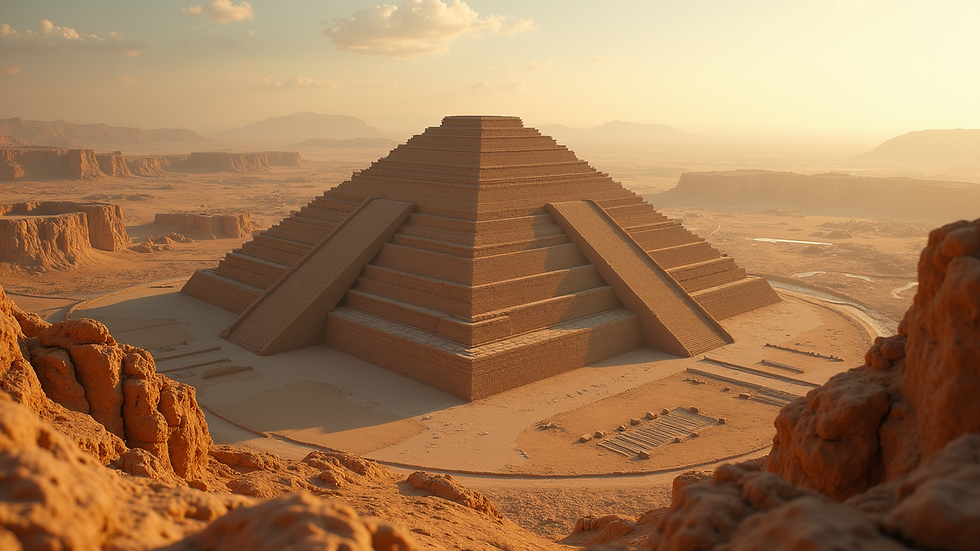Unlocking the Secrets of the Enuma Elish A Journey into Ancient Wisdom
- PsychicUnderLord (Psychic)

- Apr 30, 2025
- 4 min read
The Enuma Elish is not just one of the oldest written stories; it is a captivating glimpse into the psyche of an ancient civilization. Dating back to around 2000 BCE, this Mesopotamian creation myth illuminates the rich cultural tapestry of the Babylonians. It highlights their views on existence, the cosmos, and humanity's role within it. Join us as we navigate the significance of the Enuma Elish, its complex structure, and the wisdom it imparts about our shared human experience.
The Historical Context of the Enuma Elish
Discovered on clay tablets in ancient Nineveh, once the capital of the Assyrian Empire, the Enuma Elish was inscribed in cuneiform script. Scholars believe it was used during religious ceremonies, particularly the New Year’s festival, to celebrate the creation of the world and reinforce the people’s identity.
The text’s central theme focuses on the creation of the universe from chaos by the god Marduk. This reflects a common ideology during Babylonian times: viewing the cosmos as a battleground between order and chaos, a theme that resonates with societies throughout history.
Structure and Themes of the Enuma Elish
The Enuma Elish unfolds through several key sections, each contributing to a larger narrative filled with complexity and depth.
Creation from Chaos
The story opens with primordial deities Apsu and Tiamat, embodying the sweet and salty waters, respectively. Their union symbolizes the chaos from which the universe emerges.
As the younger gods disrupt this chaos, Apsu, feeling threatened, plans to eliminate them. His demise at the hands of the clever god Ea emphasizes a significant theme: the victory of intelligence and order over mindless chaos. For instance, Apsu's narrative is a reminder of how the desire for control can often lead to one's downfall.
The Rise of Marduk
In the wake of Apsu's death, Tiamat becomes vengeful, seeking retaliation. The gods unite to confront her, and Marduk offers to fight Tiamat on the condition that he becomes the leader of the gods if he succeeds. His victory over Tiamat is not only a key turning point in the story but also reinforces the ancient idea of a strong leader emerging from adversity, a concept echoed in various cultures today.
The Creation of Humanity
Marduk uses Tiamat's carcass to shape the world and fashions humanity from the blood of the defeated deity Kingu. This act illustrates a complex relationship between humans and the divine: created to serve the gods yet holding inherent potential. The narrative expresses that with power comes responsibility, a timeless lesson that echoes in modern societies where the actions of leaders significantly impact their followers.

Symbolism and Cultural Significance
The Enuma Elish is laden with symbolism. For example, Marduk's battle against Tiamat represents the Babylonian struggle for identity and order in the face of chaos. This creation story serves not only as a portrayal of the Babylonians' religious beliefs but also as a unifying force for their society, instilling a shared sense of purpose.
This mythological framework provided a powerful way for the Babylonians to explore their environment and make sense of their challenges. Its influence can still be seen today, as cultures use stories to articulate identity and navigate social complexities.
The Enuma Elish in Modern Context
In our modern world, the Enuma Elish remains a source of rich inspiration. Its themes of creation, conflict, and the quest for order resonate with contemporary philosophical questions about existence and identity. Nearly 80% of university courses on ancient history reference this text, underscoring its lasting relevance.
Scholars analyze the Enuma Elish to gain insights into ancient political structures, religious practices, and even gender roles, as seen in Tiamat's representation of chaos. Readers today are encouraged to draw parallels between the text and their own lives, reflecting on how narratives of power and creation shape our understanding of the world.
Lessons from the Enuma Elish
The wisdom offered by the Enuma Elish is rich with practical insights about life. Here are some key lessons to consider:
Embrace Chaos: Just as Marduk faced chaos, confronting disruptive elements in our lives can lead to growth and order.
The Importance of Unity: The gods rallied against Tiamat, demonstrating that community support is essential in overcoming obstacles.
Responsibility of Creation: Like Marduk, we must acknowledge the impact of our actions and strive to create positive change in our environments.
Understanding Identity and Legacy: Reflecting on cultural stories can deepen our comprehension of our identities and inform how we proceed into the future.
A Journey Through Ancient Wisdom
The Enuma Elish encapsulates timeless wisdom that continues to impact us today. Its engaging narrative and profound symbolism serve as a reminder of our persistent quest for meaning, order, and identity. By studying this ancient text, we unearth insights that connect us to both our past and our present, prompting us to reflect on our individual journeys through chaos and creation.
As we explore these ancient teachings, let us remember the delicate balance between chaos and order that characterizes our existence, guiding us toward a more profound understanding of our place in the universe.



Comments